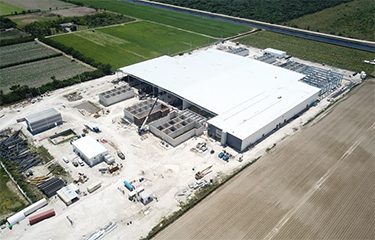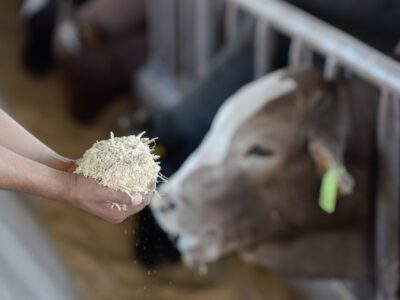Revolutionary Florida Onshore Farming Technique Could Change The Salmon Industry

“Sustainable” and “farmed salmon” are two concepts not typically used in the same sentence, but innovative seafood company Atlantic Sapphire is on a mission to change that.
With a desire to “nourish both people and planet with sustainable, ocean-safe seafood,” founders Johan Andreassen and Bjorn-Vegard Lovik have created a revolutionary and eco-friendly way to farm salmon. At their onshore location in Miami, Florida, the company uses what it calls a “bluehouse” (think greenhouse but for fish rather than plants) to grow salmon in optimal conditions. The fish are able to swim against currents as they would in the wild but without exposure to toxins or diseases.
“We are creating a micro-environment that is tailored for fish,” says Andreassen. “The bluehouse is mimicking the life cycle of wild salmon, starting in the river and ending up in the ocean. We are able to create ideal conditions for our fish from egg to harvest.”
Currents in the micro-environment tend to be even stronger than they are in the wild, and as a result, the fish become leaner and more muscular. “It has a milder taste, less of what we call the fishy flavor,” explains Andreassen.
The benefits of Atlantic Sapphire’s Bluehouse Salmon don’t end with texture and taste. The company chose its south Florida location specifically for its unique water source. The water is naturally purified through limestone rock, and Atlantic Sapphire’s innovative recirculating aquaculture system ensures the water is continuously purified throughout the life cycle of the fish.
Rather than pumping the wastewater back into the ocean (which negatively impacts aquatic life), Atlantic Sapphire recycles it in a manner that actually benefits the ecosystem. Wastewater is injected back into the limestone at the water source for natural purification, building a circular system that doesn’t tax the natural surroundings.
By farming salmon onshore in Florida, the company is able to supply its biggest domestic customers without the use of air freight. “With much of the seafood imported into the United States, we wanted to continue to make a positive contribution by seeking out a location that would further reduce our carbon footprint,” says Andreassen.
Atlantic Sapphire’s bluehouse salmon is available at retailers throughout Florida, including the Publix grocery store chain, but the company’s vision extends far beyond the regional market.
With 80 percent of seafood in the United States coming from overseas, the market’s high carbon footprint takes a toll. The rise in seafood consumption across the world is overtaxing wild fisheries, but Atlantic Sapphire’s revolutionary onshore farming method could provide a sustainable solution.
Raising fish in “bluehouses” using the Recirculating Aquatic System reduces the amount of waste that ends up in the ocean. Unlike beef and poultry farming, Atlantic Sapphire’s fish farming doesn’t produce any methane. Bluehouse environments also mean growing conditions can be controlled more easily than in the wild.
For the time being, Atlantic Sapphire will continue working to make its business as sustainable and planet-friendly as possible. They hope to create agricultural partnerships for their fish by-products, which they say can be used in fish oils and protein powders, and plan to launch biodegradable packaging.
If they’re able to implement their farming method in additional local markets, it could have an incredible impact on aquatic protein production across the U.S.– and even the globe.





